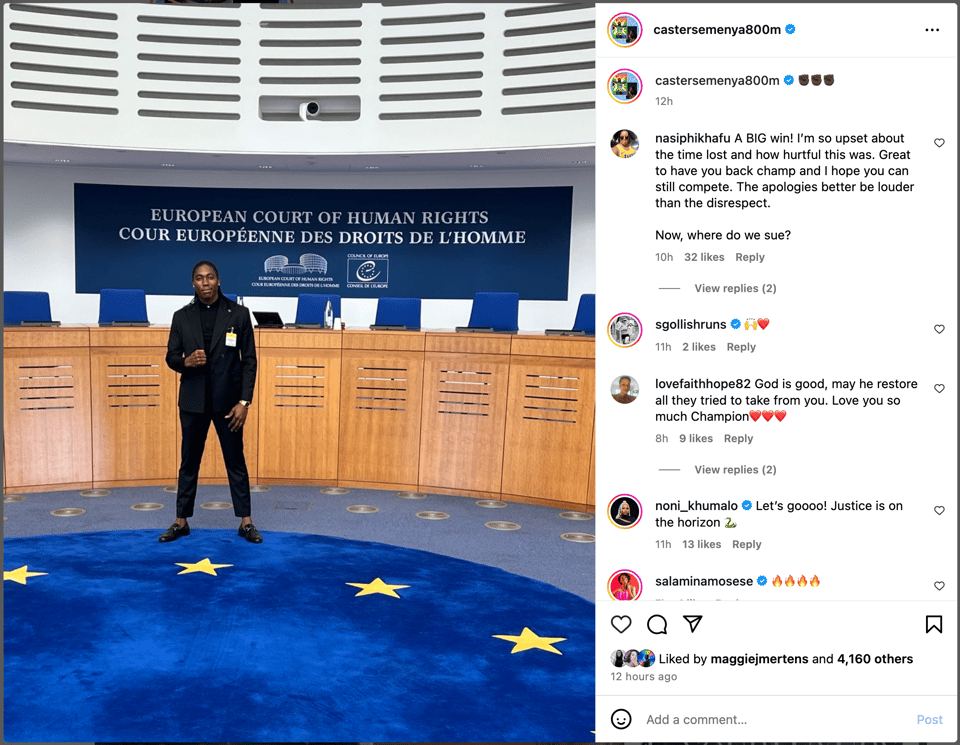The European Court of Human Rights has ruled in favor of Caster Semenya. What does that actually mean?

Today, the European Court of Human Rights issued their ruling in Caster Semenya's case and found in favor of Semenya and her team.
But what does this actually mean? Does it change the policy? Can Christine and Max run now?
The answer to those last two questions is no. This ruling does not change the current or future World Athletics policy. In fact, the case isn't really about the policy itself at all.
Buckle up, because we're going to get a little wonky.
The timeline
This has been a long, and winding case. Here's the basic gist of what has happened:
2018: Semenya took her case to the Court of Arbitration for Sport (CAS). She lost that case — as we documented at length on Tested.
2019: Semenya and her team filed an appeal with the Swiss Federal Supreme Court, arguing that CAS (an arbitration body based in Switzerland, but not technically a Swiss legal body) had come to a decision that was “incompatible with public policy.”
2020: The Swiss Federal Supreme Court dismissed Semenya's case.
2021: Semenya's legal team filed a case to the European Court of Human Rights (ECHR), arguing that Swiss Federal Supreme Court had not given her a fair trial and in their handling of her case, had violated her human rights.
July 2023: The ECHR ruled in favor of Semenya, finding that she "had not been afforded sufficient institutional and procedural safeguards in Switzerland."
November 2023: The Swiss Government filed an appeal to the ECHR, and asked for the case to be heard by the body's Grand Chamber.
May 2024: The ECHR Grand Chamber heard the case again. You can watch this hearing in full here.
Today, July 10, 2025: The ECHR Grand Chamber ruled in favor of Semenya.
The ruling
Okay so what does this ruling actually say? You can read a summary here and a Q&A here, and if you're feeling really law-brained the entire judgement here, but here's my best understanding of what this ruling actually says and what it means.
This is a win. I don't want to discount that too much.
That said, it's not as much of a win as a lot of people might think. It's more about procedure than it is about policy. The case Semenya's team made to the ECHR isn't that World Athletics violated her human rights by creating their DSD policy. Instead, the argument was about whether or not Semenya was offered a fair trial when she appealed the ruling to the Swiss Federal Supreme Court.
Which means that the ECHR has not ruled that World Athletics's DSD policy is a violation of human rights. Nor have they ruled that the Court of Arbitration for Sports violated Semenya's human rights during the trial. They have instead ruled on something a lot more limited and procedural: that when considering her case, the Swiss Federal Supreme Court should have done a more thorough job evaluating the impact on human rights, and the opinions of experts on what impact the policy could have.
But it’s also worth noting that the court declined to rule on other aspects of this case, including whether or not Semenya had been discriminated against in the Swiss court.
So this isn't nothing. But it's also not a slam dunk either, nor will it end these policies. What this means is that in the future, should an athlete want to appeal the ruling of CAS to the Swiss Federal Supreme Court, that court might have to consider that complaint differently than they have on the past.
When the ECHR first ruled in Semenya's favor, Seema Patel, a professor of sports law at Nottingham Law School, told me that "Neither the CAS nor the Swiss Federal Supreme Court evaluated the DSD Regulations against the requisites of human rights law. The ECtHR’s judgment in Semenya v. Switzerland confirms that this approach—sidestepping international human rights law in sport disputes—is no longer tenable.”
I spoke with Henk this morning and he told me he's excited by the ruling, not necessarily because of the specifics, but because it means that perhaps the tides are turning a little bit. I texted Carlos Sayao as well, one of the lawyers who works with Caster, but haven’t heard back.
Caster herself celebrated the win with a photograph on Instagram:

She also issued a statement to some press outlets, saying:
I have waited 15 long years for this judgment. Today, my patience in this journey has been rewarded with a result that will pave the way for all athletes' human rights to be protected.
I have given up what I wanted in the hope that others may have what they need. I hope this victory will inspire young women to be and to accept themselves in all their diversity.
There is still much work ahead to achieve justice for women in sport and I will continue to support this effort and fight for young women athletes.
I’ve reached out to some of the legal team to ask what is next for this fight. As far as I’m aware Max's CAS case still hasn't been updated or announced and that means I still can't share anything I know about it with you.
If this feels absurd (it's been over a year!) believe me, I know. I'm frustrated too.
Some speculation
One piece of speculation I've heard from a few folks in this space, is that the UK and the US's turn towards rampant transphobia and anti-science policies around gender have actually made the rest of the world swing a bit the other way. International legal bodies do not want to be on the same side as Donald Trump. Sebastian Coe's loss of the IOC bid (which we talked about here) was another signal that, perhaps, there is less of an appetite for this kind of exclusion than there was during the last few years.
This is, again, totally speculation. But it's an interesting thing to be hearing a lot among folks following this topic.
Behind the scenes
After a lot of conversations, we chose not talk about this case on Tested at all. It's mentioned just once, in episode six. I say "Last year, Caster Semenya won a case in front of the European Court of Human Rights — a ruling that is now being challenged by the Swiss government." And then we move on. Because, well, you just read a whole long thing about how complicated and procedural this thing is! It just didn't feel like we had the time to break all this down in an episode.
But now you know!
That’s all for this quick update. If you have questions about the case let me know!